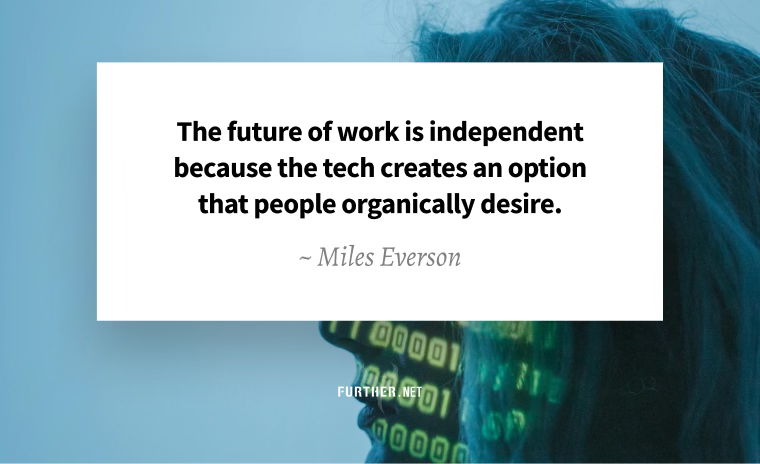The Inevitable Rise of the Independent Workforce
Being independent is now a sign of status. Being location-independent has even more status.
What’s behind the surge in people ditching traditional employment and heading out on their own?
Other than Corporate America’s propensity to hire you when it’s convenient and dump you when it’s profitable, of course. We all know that part.
Most people would point to the pandemic. And it’s true that COVID-19 did spark an acceleration in people going independent, which is an umbrella term for freelancers, consultants, solopreneurs, and independent contractors of all kinds.
That acceleration was remarkable.
From the fall of 2021 through the spring of 2022, the Great Resignation resulted in the highest percentage of “job quitting” in the 21 years that the US Bureau of Labor Statistics has been keeping such records.
The result? There were 72 million U.S. independent workers in 2023, up 41% over 2021 and up 88% over 2020.
Beyond independence from traditional employment, the pandemic highlighted a particular type of business and an exciting form of freedom: location independence. Tales of laptop warriors living anywhere and working from wherever permeated the collective consciousness.
But the pandemic didn’t start the fire; it just ignited what was already primed to explode.
A Brief History of the Independent Workforce
From my perspective, the Great Recession that began in late 2007 and ran through mid-2009 was an earlier major catalyst for the movement. Mass layoffs forced aspiring entrepreneurs to go independent out of necessity.
This is the time when I watched scores of people start their own businesses and saw many of them become early digital nomads or simply relocate somewhere more pleasing.
I had that front-row seat because I helped many of those people achieve their goals, thanks to positioning myself to teach them what I knew well before the recession.
And I could do that because I'd spent the previous seven years figuring out how to build businesses powered by the internet, through trial and (lots of) error.
But obviously, we can go back even further. After all, if I started back in 1998, so did others. And that emerging trend had caught the attention of a young lawyer-turned-speechwriter named Dan Pink.
Dan documented the growing trend in an article entitled “Free Agent Nation” for the 12th issue of Fast Company magazine at the tail end of 1997. He told of a future dominated by independent contractors and project-based work similar to the “Hollywood model” of assembling talented teams on a project-by-project basis.
This led to Free Agent Nation, the book. It was here that Pink related the stories of several of these internet-powered independent workers, including yours truly. It’s a trip to look back at that era now and think about how clueless I was. I just wasn’t as clueless as the general public, a status I shared with many of my fellow fledgling digital entrepreneurs of the time.
And of course, the true genesis of the accelerating trend toward an independent workforce goes back well beyond my personal story. For that, we need to travel to that magical time of avocado green appliances, disco fever, and questionable mustaches.
That’s right, the 1970s.
Back in 1973, a guy named Ivan Illich wrote a book called Tools of Conviviality, which advocated for technology that enhanced human capability and creativity rather than dominating or replacing human agency. Illich’s basic argument boiled down to the premise that technologists should “give people tools that guarantee their right to work with independent efficiency.”
This book had an outsized influence on a small, powerful sect of readers. Three of those readers were named Steve, Steve, and Bill. That’s Jobs, Wozniak, and Gates.
And thus began the personal computer revolution.
The Tools that Fuel a Natural Desire for Self-Determination
People can point to the internet, smartphones, worldwide social media reach, inexpensive software, and artificial intelligence as the dominant triggers that enable individuals to earn a living outside of having a job, but none of those things happen without the creation and wide adoption of personal computers.
It was at this point that the independent workforce became inevitable. In line with Illich’s mandate, evolving technology created an alternative option to traditional employment because that’s something that humans naturally want.
For the vast majority of human existence, people worked for themselves, their families, or their immediate communities. The idea of selling your labor — not just your products, but your actual time, effort, and capabilities — to a faceless corporate entity is extraordinarily recent.
The modern employment contract, in which you voluntarily agree to be present at predetermined times, follow company policies, and dedicate your mental and physical energy to advancing someone else's profit margins, is… well, fairly insane from a historical standpoint.
Author and CEO Miles Everson argues that things like online shopping and streaming video were inevitable as soon as they became possible, because duh… people naturally want these things. The same is true when he says the future of work is independent, because the tech creates an option that people organically desire.
Then factor in the fact that the impulse driving the desire for independent work is much stronger than the convenience of Amazon or the entertainment selection of Netflix. It goes straight to the heart of the three elements that transform “making a living” from a burdensome chore to a meaningful mission:
Autonomy
Mastery
Purpose
These are the basic psychological needs that fuel intrinsic motivation, which Dan Pink explored in a different book called Drive. The book is based primarily on research related to self-determination theory, which was developed by psychologists Edward Deci and Richard Ryan, coincidentally also in the 1970s.
These three psychological needs are exactly what’s missing from modern employment, resulting in a workplace littered with so-called “bullshit jobs.” Most roles strip away the essential things that make work worth doing: control over your time, the ability to get better at a true craft, and doing something that actually matters.
These roles are also designed to make you replaceable. From a metaphorical cog in the machine to a literal one. Search your feelings, Luke… you know it’s true.
Based on this fundamental mismatch between human psychological needs and corporate employment structures, the benefits of going “indie” easily transcend money.
For example, 64% of freelancers say they wouldn't go back to a traditional 9-5 job, no matter the pay. One reason why is that 77% of freelancers have a better work/life balance than traditional job holders, even as they make more money than they used to.
But here's the inconvenient truth. Despite the natural desire to go independent and all the related non-monetary benefits, it’s the threat of “no money” that often provides the necessary kick in the ass that gets people to do it.
And that’s usually thanks to a layoff.
Don’t Wait for the Inevitable Betrayal
We’ve already talked about the Great Recession and its massive layoffs. And despite the proactive movement of the Great Resignation, some people stuck it out with the shiny new jobs they had landed just before and during the pandemic.
Bad move. Starting in 2022 and extending into 2023, “Big Tech” instigated its own massive layoffs, even as profits continued to soar. While the companies shrugged and admitted (read: lied) that they had simply overhired, workers rightfully felt betrayed.
Can you blame them?
Meta fired 11,000 people while spending $13.7 billion on metaverse fantasies.
Amazon axed 18,000 workers while Bezos bought a $500 million yacht.
Google eliminated 12,000 jobs while paying its CEO $226 million.
The message was crystal clear: Your loyalty is worthless. You're disposable.
As a result, many of those former employees said, “Never again.” They decided to avoid a job search and traditional employment altogether and start their own businesses.
This display of mass initiative was remarkable. Out of the 4,188 respondents to Clarify Capital's 2022 survey, 1,007 had started their own companies post-layoff.
In a separate survey of 500 knowledge workers, 66% said they were ready to “break up with full-time employment” because “the recent waves of layoffs have made them lose trust in the stability and security of full-time employment.”
Let me present to you the proposition that these tech companies were simply ahead of the curve, having already implemented advanced automation and artificial intelligence into their workflows. When the time was right, the humans were cut.
When the next big recession hits (and it will, likely soon), you’ll see this same thing happen at scale. It’ll be a stupid move, but when has that ever stopped them?
When this point arrives, you’re going to have to show the same initiative to start your own thing. Fortunately, you’re at an age and experience level where you’re likely to succeed.
That’s because you have something they can't automate, outsource, or eliminate. And that’s decades of hard-won expertise that, when combined with AI in a solo business structure, becomes unstoppable.
Look, we’re old enough to remember when the terms “freelancer” or “consultant” were taken as code for being between “real” jobs. That’s not the case anymore.
Being independent is now a sign of status. Being location-independent has even more status, along with benefits that go well beyond Instagram moments, given the current instability in the United States.
You can wait for the inevitable layoff to force your hand. Or you can start building your economic escape plan while you still have a paycheck funding it.
The smart ones are going to survive what's coming by going indie. And it’s the most natural thing in the world for a human to do, especially now that we have easy access to the powerful tools to do it.
Keep going-
P.S. New to Further? Join us here. Existing subscribers can go much deeper by upgrading to Further Premium.
further: flashback
🎶 Oasis - D’You Know What I Mean?, Be Here Now, 1997 🎶
The hype leading up to the release of Be Here Now — the third studio album from Oasis — was in no way justified by the songs we got. But lead single D’You Know What I Mean? keeps getting better with age. Cool video too. (YouTube)
further: sharing
Enjoy this issue? Please forward this email to friends or share by clicking below:
Or you can earn access to Further Premium by recommending Further in general.
Grab your unique referral code here.
Thank you for sharing Further!




Ivan Illich...I remember seeing his book, Tools for Conviviality, when I was travelling in Europe back in 1992, and for some reason was drawn to buy it. A full circle moment!
Love this: "The modern employment contract, in which you voluntarily agree to be present at predetermined times, follow company policies, and dedicate your mental and physical energy to advancing someone else's profit margins, is… well, fairly insane from a historical standpoint."